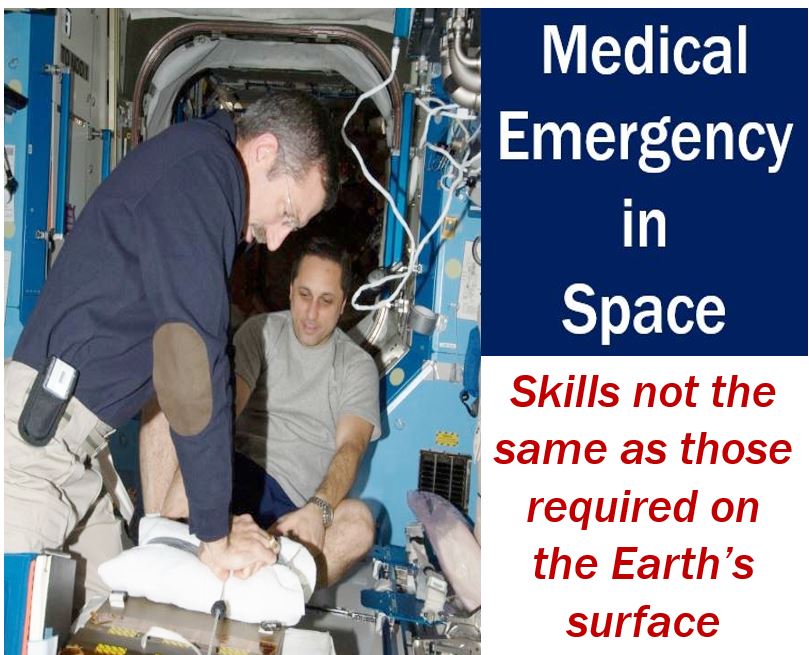Medical emergencies in space are often significantly different to those on Earth, a team of scientists explained at Euroanaesthesia 2017, Europe’s largest annual event showcasing the latest in medical and scientific breakthroughs. This year, Euroanaesthesia is being held in Geneva, Switzerland, from 3rd to 5th June.
Resuscitating somebody, responding to a heart attack, a serious cut, and some other types of medical emergencies in space is not easy. For a start, unless the patient is strapped down, he or she tends to float away.
With space travel advancing at breakneck speed, it will not be long before ordinary people – not just astronauts – will be travelling beyond our planet.
 Regarding this image, NASA writes: “NASA astronaut Dan Burbank (foreground), Expedition 30 commander, and Russian cosmonaut Anton Shkaplerov, flight engineer, participate in a Crew Health Care System (CHeCS) medical contingency drill in the Destiny laboratory of the International Space Station. This drill gives crew members the opportunity to work as a team in resolving a simulated medical emergency onboard the space station.” (Image: adapted from nasa.gov)
Regarding this image, NASA writes: “NASA astronaut Dan Burbank (foreground), Expedition 30 commander, and Russian cosmonaut Anton Shkaplerov, flight engineer, participate in a Crew Health Care System (CHeCS) medical contingency drill in the Destiny laboratory of the International Space Station. This drill gives crew members the opportunity to work as a team in resolving a simulated medical emergency onboard the space station.” (Image: adapted from nasa.gov)
Astronauts are selected for their excellent health and tip-top physical fitness. It will not be long before wealthy citizens will be traveling in space in large numbers – space travel tickets are expensive. Many of these ordinary, wealthy citizens will not be as physically healthy as astronauts.
This means that when the space travel industry expands, the number of medical emergencies in space will grow.
Special training for medical emergencies in space
Spaceship crews will need to have special training and equipment for medical emergencies in space – micro-gravity CPR training, for example, is quite different from what is taught for situations on the Earth’s surface, or even aboard an airplane.
When there is no gravity, you cannot use your own body weight to assist you during CPR. If you push against somebody’s chest with your hands, you and the patient would float away – even if he or she is strapped down, you will float away.
In a Times Live article, published on June 5th, Katharine Child quoted Jochen Hinkelbein, from the department of anaesthesiology and intensive care medicine at the University Hospital of Cologne in Germany, who said:
“Because astronauts are selected carefully, are usually young and are intensively observed before and during their training, medical problems are rare in space.”
“However, in the context of future long-term missions, for example to Mars, with durations of several years, the risk for severe medical problems is significantly higher. Therefore, there is also a substantial risk for a cardiac arrest in space requiring CPR.”
Our research is featured on the @TimesLIVE website! #space #medicine #euroanaesthesia2017 https://t.co/MbWeoAR0pa
— Matthieu Komorowski (@matkomorowski) June 5, 2017
Special medical techniques required in space
Experts on medical emergencies in space explain that one technique for giving CPR is to wrap your legs around the patient’s body to prevent him or her from floating away.
Medical emergencies in space training need not necessarily occur away from Earth. It can be done with underwater space simulations.
Training for medical emergencies in space will have to be given to all crew members – perhaps even future passengers might have to learn some basic skills.
Matthieu Komorowski, who works at Charing Cross Hospital in London, said:
“In the worst case , non-medical personnel might have to care for an injured or ill crew member. Far from low-Earth orbit, real-time telemedicine will not be available and the crew will need to be self-reliant.”
“Duplication of skills will be critical to enhancing crew safety, especially if the doctor on board himself becomes ill, incapacitated or dies. As such, extending basic medical training to most crew members will be extremely important.”
“In remote environments, medical and surgical [interventions] with a low probability of success, that require using vast quantities of consumables, are often not attempted. This means the crew needs to prepare for people dying from illnesses or injuries that will exceed their limited treatment capability.”
Video – Medical emergencies in space
As this Seeker video explains, handling medical emergencies in space is very different from handling them on Earth.
